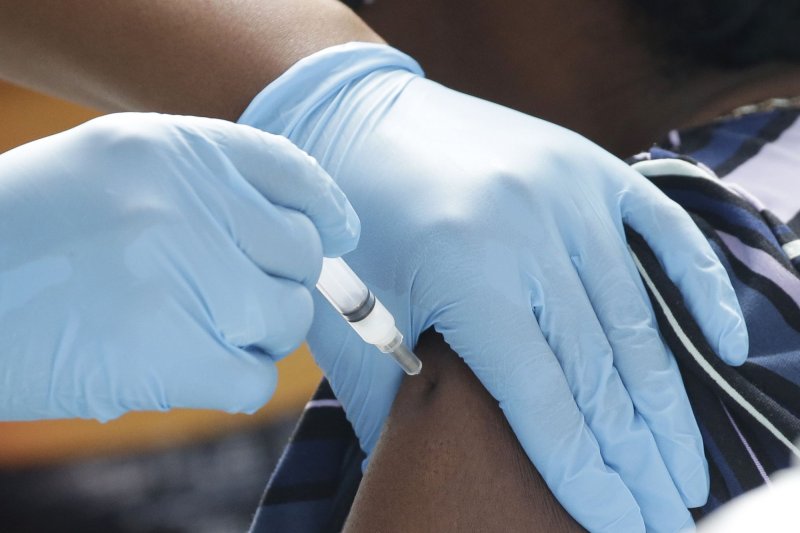
Understanding the concerns of vaccine-hesitant people could help to convince more of them
Photo by John Angelillo/UPI | License Photo
July 30 (UPI) -- Survey data collected at an anti-vaccine conference in Poland suggests most vaccine skeptics and antagonists are motivated by a generalized negative attitude to vaccines, not direct experience.
Previous studies suggests those opposed to vaccines are unlikely to be persuaded otherwise, at least in the short term, but the latest findings -- published Friday in the journal Social Psychological Bulletin -- may help public health officials get through to those who are "vaccine hesitant."
For the study, scientists surveyed attendees of a conference where speakers presented anti-vaccine arguments.
Researchers found most survey participants reported their antagonism was based on their own or observed negative experiences with vaccines. However, the same participants were vague when citing those experiences and the sources of their information.
RELATED Study: COVID-19 vaccine hesitancy holding constant among some groups
Most critics of vaccines cited concerns about autism, allergies or children getting sick from vaccines, though were unable to cite evidence of correlation.
Psychological research suggests it is common for negative reports to stand out in people's minds. As well, when negative misinformation spreads, people who receive said misinformation from multiple sources are likely to forget where it came from.
Instead, people misattribute their negative beliefs about vaccines to direct experience or the experiences of close friends and relatives.
"Confirmation bias consists of an individual actively seeking information consistent with their pre-existing hypothesis, and avoiding information indicative of alternative explanations," researchers wrote in their paper.
"Therefore, a pre-existing negative attitude toward vaccines may cause individuals to interpret negative symptoms as consequences of vaccines, further reinforcing the negative attitude," the researchers wrote.
In addition to harboring fears about negative side effects, vaccine opponents claim vaccines are insufficiently tested and fail to protect society against infectious diseases. They also believe anti-vaccine leaders are more devoted to protecting the public than physicians who advocate for vaccines.
July 30 (UPI) -- Survey data collected at an anti-vaccine conference in Poland suggests most vaccine skeptics and antagonists are motivated by a generalized negative attitude to vaccines, not direct experience.
Previous studies suggests those opposed to vaccines are unlikely to be persuaded otherwise, at least in the short term, but the latest findings -- published Friday in the journal Social Psychological Bulletin -- may help public health officials get through to those who are "vaccine hesitant."
For the study, scientists surveyed attendees of a conference where speakers presented anti-vaccine arguments.
Researchers found most survey participants reported their antagonism was based on their own or observed negative experiences with vaccines. However, the same participants were vague when citing those experiences and the sources of their information.
RELATED Study: COVID-19 vaccine hesitancy holding constant among some groups
Most critics of vaccines cited concerns about autism, allergies or children getting sick from vaccines, though were unable to cite evidence of correlation.
Psychological research suggests it is common for negative reports to stand out in people's minds. As well, when negative misinformation spreads, people who receive said misinformation from multiple sources are likely to forget where it came from.
Instead, people misattribute their negative beliefs about vaccines to direct experience or the experiences of close friends and relatives.
"Confirmation bias consists of an individual actively seeking information consistent with their pre-existing hypothesis, and avoiding information indicative of alternative explanations," researchers wrote in their paper.
"Therefore, a pre-existing negative attitude toward vaccines may cause individuals to interpret negative symptoms as consequences of vaccines, further reinforcing the negative attitude," the researchers wrote.
In addition to harboring fears about negative side effects, vaccine opponents claim vaccines are insufficiently tested and fail to protect society against infectious diseases. They also believe anti-vaccine leaders are more devoted to protecting the public than physicians who advocate for vaccines.
Those who identified as vaccine hesitant were more confident about efficacy of vaccines, as well as the reliability of research and testing, but these skeptics were still sympathetic to claims made by the anti-vaccine proponents about side effects and the "Big Pharma conspiracy."
Surprisingly, opponents of vaccines were more confident than those who were vaccine hesitant about the ability of modern medicine to handle the pandemic.
The findings suggest public health officials may be able to get through to those that are hesitant about vaccines by addressing their specific concerns about side effects, the researchers said.
The authors of the new study also suggest vaccine outreach should feature positive, prosocial arguments, such as the reasons medical professionals recommend vaccines.
Surprisingly, opponents of vaccines were more confident than those who were vaccine hesitant about the ability of modern medicine to handle the pandemic.
The findings suggest public health officials may be able to get through to those that are hesitant about vaccines by addressing their specific concerns about side effects, the researchers said.
The authors of the new study also suggest vaccine outreach should feature positive, prosocial arguments, such as the reasons medical professionals recommend vaccines.
No comments:
Post a Comment